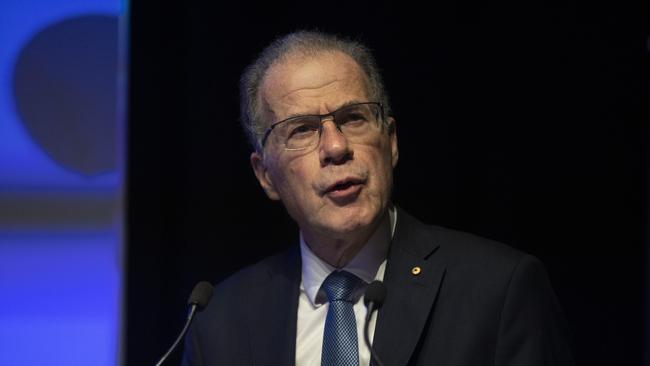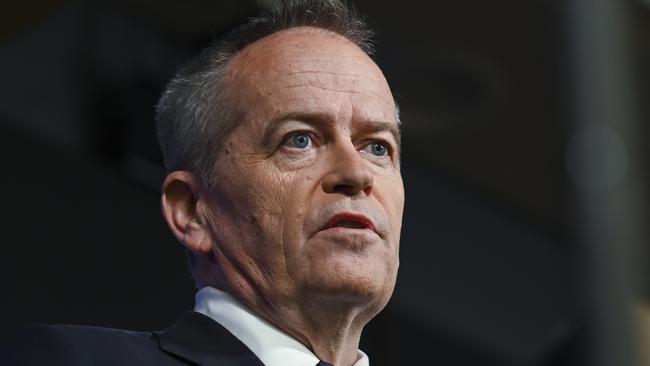NDIS ‘no magic pudding’, says disabilities expert Bruce Bonyhady
The cost of the National Disability Insurance Scheme might be rising faster than we understand, the head of the government’s independent review Bruce Bonyhady says.

The National Disability Insurance Scheme has become a “magic pudding” for governments, service providers and some people with a disability and the $35bn program’s rising costs are greater than have been publicly revealed, the head of the Albanese government’s NDIS review warns.
Bruce Bonyhady also says governments at all levels must return to providing support for people with disability outside the scheme, after virtually vacating the field since the NDIS’s introduction 10 years ago.
And more children with developmental concerns should have greater access to early intervention in mainstream settings rather than relying on a place in the NDIS, he adds.
In two landmark speeches to a disability conference in Newcastle on Tuesday, Professor Bonyhady says governments are too often looking to use the NDIS as a replacement for services in health, early childhood, education, housing and transport.

“We must stop thinking of the NDIS as though it is a limitless magic pudding,” he says.
“What has become clear is that, often without intending to, governments, service providers, and some people with disability and their families, have all started to treat the NDIS as a limitless resource. Governments, while funding the NDIS and worrying about its increasing costs, keep helping themselves to new slices of the NDIS.”
Figures from the National Disability Insurance Agency released last week revealed the scheme would cost an estimated $35bn in 2022-23, and had 610,000 participants, up by nearly 76,000 in a year. The average annual plan payment is more than $60,000. Along with aged care, health, defence and interest payments on national debt, the NDIS is one of the fastest rising costs in the budget, the latest Intergenerational Report will reveal on Thursday.
NDIS Minister Bill Shorten hand-picked Professor Bonyhady last October along with former senior public servant Lisa Paul to co-chair an independent review of the scheme amid concern about its sustainability and poor participant experience. In April, Mr Shorten said the NDIS had “lost its way” and needed an urgent reboot.
With NDIS cost growth hitting 14 per cent a year and NDIA financial projections suggesting it was heading toward $90bn a year by 2031-32, national cabinet in April intervened, agreeing to a new annual cost growth target of 8 per cent to be met by 2026.
However Professor Bonyhady warns this may be difficult to achieve. “Some people seem to believe that rising costs are not as significant as we have been told. I am here to tell you that, if anything, the outlook for rising costs is even greater than you have been told,” he says. “Due to unmet and still-unrevealed demand, the scheme is in danger of overshooting its target of containing expenditure growth at 8 per cent.”
Professor Bonyhady says the NDIS is unique, a “policy miracle” delivering support for people with disability, and is changing the lives of hundreds of thousands of people. “(But) it is too inequitable – overdelivering for some, underdelivering for many, and not delivering at all for the majority of Australians with disability,” he says.
Last month the review flagged that the scheme’s sustainability had been called into question. It also found that some participants were being funded for services that were “increasingly unreasonable and/or unnecessary”.
The review also noted that far more children than projected were finding their way onto the NDIS, many with a diagnosis of autism.
Professor Bonyhady’s speeches offer the clearest indication so far of the review’s reform thinking, ahead of its widely anticipated final report due in October. The review is pushing to end the problem of the NDIS being the “oasis in the desert” for people with disability, he says, where those securing a spot are looked after and those who don’t left out in the cold.
Rather, there should be services for people with disabilities to provide assistance with shopping, gardening, cooking and cleaning outside the NDIS, as there once were in many places through local government arrangements.

Professor Bonyhady says the NDIS isn’t working properly for children with developmental concerns, with early childhood an area “that needs a complete and urgent rethink”.
Currently 11 per cent of boys and 5 per cent of girls aged 5-7 in Australia are on the NDIS, with autism the most common diagnosis, the latest NDIS quarterly report finds.
“Twenty per cent of children experience learning difficulties, developmental concerns, developmental delay or are found to have disabilities,” he says. “In other words, learning difficulties and disability are mainstream issues. Unless there is a need for clinical intervention (early intervention) needs to be delivered mainly in homes, early childhood settings and schools.”
To counter concerns about NDIS participants going beyond what supports are “reasonable and necessary”, he says the review is proposing a system where an overall package is provided rather than ruling on each item line by line. And assessments should be made centrally at the NDIA rather than being outsourced to local area co-ordinators as is currently the case.
Professor Bonyhady also warns that the NDIS market is failing, and other payment approaches to providers than fee-for-service should be considered.
“This headlong drive for more and more supports has been fuelled by the market settings,” he says.
“Instead of primarily driving up innovation, those market settings have largely driven up demand and costs. Instead of primarily driving inclusion and participation, those market settings have led to new forms of segregation and exclusion and, in the worst cases, abuse and exploitation.”

While some disability service providers say they can’t make the numbers work to stay solvent, the review has heard of many cases of overcharging, over-servicing and even outright fraud, Professor Bonyhady says, leading to the review’s recommendation for a major investment in scheme integrity.
And with an additional 128,000 workers required in just the next two years to support NDIS participants, the review will call for more micro-credentials and a portable training allowance.








To join the conversation, please log in. Don't have an account? Register
Join the conversation, you are commenting as Logout